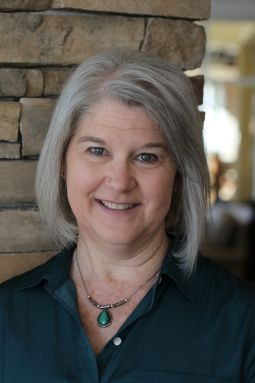Are Conversations Too Risky?
Debra Anderson, assistant professor of Training and Mentoring, chair of the Training and Mentoring Curriculum
Originally published in Engage Magazine, 2023-24
After teaching a class on mentored formation, my colleague relayed to me a student’s question, “What if my mentor asks me to reveal my deeper thoughts?” They had been in discussion about how to identify a mentor who can observe and companion their experiences and questions in the context of their lives. His question revealed that he was weighing the risk of honest conversation.

As I led the same course in a different semester, one of my learners in her fifties looked doubtful as she asked me, “What do I talk about with a mentor?” Other students nodded, anticipating my response. All understood the benefit of a mentor but expressed a lack of skill in holding suitable conversations. Mentoring is a reflective relationship expressed in conversation and commitment as well as in silence and subtle nonverbals. My colleagues and I have long taught that mentoring is a mutual relationship for the purpose of growth.
Mentoring, in our learning context, allows each person to grow, to be seen, to see one another, and to see themselves more clearly in light of who Christ is. Mentoring that informs can be helpful at times, such as teacher to student or master to apprentice. But, in our courses, we invite students to engage in mentoring conversations that transform.
There have always been skeptics. From time to time, learners have asked me, “Do we have data that shows that this works?” We do. But concerns are now shifting from skepticism toward anxiety—beyond needing proof to needing peace about the process. For some, the shift has been swift from, “I wish I had a mentor,” to, “I cannot conceive of trusting someone to mentor me.”
Much has been written elsewhere about the ways the pandemic era changed how we connect. Our collective move back toward fully engaged, redemptive relationships feels sluggish. Though we longed to be back together, many of us had conversations that wounded us in the meantime. The act of talking transformatively, face to face, according to another student, is now “implausible.”
“Mentoring is a reflective relationship expressed in conversation and commitment as well as in silence and subtle nonverbals. My colleagues and I have long taught that mentoring is a mutual relationship for the purpose of growth.”
Henri Nouwen once journaled, “It always strikes me how grateful people are for a good spiritual conversation, but also how hard it is to make such a conversation happen.”1 Why is such conversation so difficult to have?
What Are We Turning From?
In the digital age of online conversation, discussion dominates our talk-style. This form of conversation analyzes an idea or draws a conclusion. Discussions can be laced with competition. We often engage it at the expense of the other.
But we have not shifted away from discussion. What we’ve turned from is dialogue.
Dialogue takes place between people who seek to draw out one another’s voices. It nurtures a goal of understanding. Each speaker is a listener who can be heard and known. Thus, dialogue feels risky. It requires us to open ourselves to new knowledge, to see new needs, and even to change our minds. Among the forms of communication, dialogue has retreated like a turtle hibernating in the mud of a frozen pond. The colder the conversation’s temperature gets, the lower our energy.
Communication experts talk about the enemies to deeper conversation, detractors that we have nurtured during this pandemic era. First, prior to the pandemic, Christopher C. Smith wrote about conversation in Christian communities and noted that “anonymity and disengagement” are “antithetical to conversation.”2 Anonymity and disengagement were well-used tactics during lockdown. Many grew accustomed to relational distance, both physically and emotionally. As social conversation turned to debate and diatribe, some disengaged or avoided associations. Confidence in conversational skills diminished when people couldn’t find a way around dissention.
“Dialogue takes place between people who seek to draw out one another’s voices. It nurtures a goal of understanding. Each speaker is a listener who can be heard and known. Thus, dialogue feels risky.”
A second enemy was noted by a team of authors exploring formational mentoring communities in higher education. They wrote, “In a highly competitive and judgmental culture, investment in relationships requires courage.”3 We have all watched the past few years fertilize postures of competition and judgment. Disputes and denunciations have germinated in our relational soil. If we couldn’t tolerate pushing against judgment and competition, we likely chose anonymity and disengagement.
Neither of these enemies takes us toward mutuality. Is the path to cooperative, two-way dialogue really too risky?
The Risk of Conversation

Deeper conversations can feel demanding. Dialogue is not superficial, brief, or convenient. It’s still kind to savor long talks. It’s generous to go out of our way to have them. Our nearness to one another is an act of goodness. We lose some character development when we lose dialogue.
Long before the pandemic developed, Sherry Turkle’s research claimed that we were in a “flight from conversation” due to our technological dependency. Her work prophetically notes, “At first we speak through machines and forget how essential face-to-face conversation is to our relationships, our creativity, and our capacity for empathy.”4 Relying on texts and emails full of emojis—fragments of conversations—rather than words maintains networks at the cost of formation.
In quarantine, our desire for deeper, mutual conversation may have grown drowsy, but it didn’t disappear. Video conference platforms helped us achieve tasks, but made us restless for human presence, particularly when we Zoomed with counselors, mentors, and loved ones. Writing about the use of video platforms for the practice of conference, Joanne Jung asserts, “Though offline meetings are sporadic, as members grow closer through the video conferences, the desire to meet more often in person also grows.”5 Reanimating this desire to converse in person again is challenged by our belief that our adaptations during isolation were entirely positive.6
Jung adds that our electronic modalities haven’t provided the level of connection we long for. “The addictive quality of our devices has caused people to be uncomfortable around each other and incapable of meaningful conversation.”7 One student commented that in this technological age, meeting a mentor in person feels restrictive. I wonder. Does it just feel too vulnerable?
Turkle’s research answers this sentiment. “We fear the risks and disappointments of relationships with our fellow humans. We expect more from technology and less from each other.”8 Connection doesn’t equal relationship, but conversation can cultivate relationship if we’ll take the risk of messiness. In spite of our big jumps away from dialogue, what we need to learn is how to stay put.
Turning Toward Conversation
If we are going to invest in transformative conversations with mentors as well as loved ones, we can begin by examining our assumptions. Jim Knight suggests that our dialogue will take a more beneficial turn if we explore our beliefs. Do we see conversation partners as equals? Do we believe the other has something to say that we want to hear? Do we believe others should have autonomy in their thought life? Is our ability to judge others threatened by conversation? Is conversation a monologue, or a back-and-forth experience? Should conversation be life-giving, or something else?9
With our beliefs clarified, faithful dialogue can follow suit and tend to more than our need for sense-making, but to our very souls. Jung offers some helpful advice:
- Eliminate competing distractions, such as all devices.
- Make time for conversation at your best time of day.
- Look at the speaker’s eyes.
- Listen and do not worry about your response.
- Let the conversation inform your prayers.10
If we are persuaded—or worse, manipulated— we are not partners in a dialogue. We have suffered many losses in the preceding years. Should mutually transformative conversations be one of them?
Debra Anderson is an assistant professor of Training and Mentoring, and chair of the Training and Mentoring Curriculum. She holds an MA in Christian Education from Gateway Seminary and draws from over thirty years of ministry experience to equip students to understand and pursue character formation and professional development.
1Henri Nouwen and Robert Durback, “Unpublished Journal” in Seeds of Hope: A Henri Nouwen Reader (New York: Image Books, 1997), 115.
2C. Christopher Smith, The Virtue of Dialogue: Conversation as a Hopeful Practice of Church Communities. (Englewood, CO: Patheos Press, 2012), loc 463, Kindle.
3Peter Felten, H-Dirksen L. Bauman, Aaron Kheriaty, and Edward Taylor, Transformative Conversations: A Guide to Mentoring Communities Among Colleagues in Higher Education (San Francisco: Jossey Bass, 2013), 39.
4Sherry Turkle, Reclaiming Conversation: A Power of Talk in a Digital Age (New York: Penguin Books, 2015), 16–17.
5Joanne J. Jung, The Lost Discipline of Conversation: Surprising Lessons in Spiritual Formation Drawn from the English Puritans (Grand Rapids: Zondervan, 2018), 149.
6Salvador Rodgriguez, “As the pandemic fades, some Americans are anxious about a return to normal,” CNBC.com, March 20, 2021, https://www.cnbc.com/2021/03/20/why-some-are-averse-to-return-to-normal-post-covid.html.
7Jung, 152.
8Sherry Turkle, Alone Together: Why We Expect More from Technology and Less from Each Other (New York: Basic Books, 2017), 13.
9Jim Knight, Better Conversations: Coaching Ourselves and Each Other to be More Credible, Caring, and Connected (Thousand Oaks, CA: Corwin, 2016), 21–40.
10Jung, 55.
